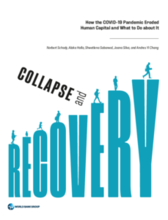This World Bank report provides a first comprehensive review of global data for young people who were under the age of 25 during the pandemic. It shows that the COVID-19 pandemic disrupted human capital accumulation at critical moments in the life cycle, derailing development for millions of children and young people in low- and middle-income countries.
COVID-19 dealt the biggest setback to global poverty-reduction efforts in decades – 70 million more people pushed back into extreme poverty. But it also caused a hidden but massive collapse in the human capital of young people at critical moments in the life cycle. The impact was much greater in poorer countries.
If unaddressed, there is a great risk that these setbacks will have long-lasting ramifications on human capital accumulation, earnings and economic growth. The cost of inaction is high and the time to act is short. Gaps will widen over time if not addressed.
Findings
The pandemic caused a hidden but massive collapse in the human capital of young people at critical moments in the life cycle:
- Millions of children faced reductions in health care—including missed critical vaccines. They also faced more stress in their care environments—orphanhood, domestic violence, suboptimal nutrition—which led to declines in school readiness and declines in social and emotional development.
- Preschool-age children in multiple countries lost more than 34 percent of learning in early language and literacy and more than 29 percent of learning in math.
- School closures and ineffective remote learning caused students to miss out on learning and to also forget what they had learned: on average, for every 30 days of school closures, students lost about 32 days of learning.
- 40 million people who would have had a job in the absence of the pandemic, did not have one at the end of 2021, worsening youth unemployment trends. In multiple countries 25 percent of all young people were neither in education, employment nor training in 2021.
Gaps will widen over time if not addressed.
- The cognitive deficit in today’s toddlers could translate into a 25 percent decline in earnings at their prime working age.
- Today’s students in low- and middle-income countries could lose up to 10 percent of their future average annual earnings due to the COVID-related education shocks. Globally, this generation of students risks losing $21 trillion in potential lifetime earnings.”
- Losses of lifetime earnings at this scale can mean lower productivity, greater inequality, and possibly greater social unrest for decades to come.
Recommendations
Countries can and should act urgently to recover these losses and invest better in their people. Human capital is a key driver of poverty reduction and inclusive growth. It is imperative for building resilience in the face of current and future crises and shocks.
Immediate policy actions could include:
- Vaccinations and nutritional supplementation campaigns; increasing coverage of parenting programs; increasing access to pre-primary education, expanding coverage of cash transfers for vulnerable families.
- Increasing instructional time; assessing learning and matching instruction to students’ learning level; and streamlining the curriculum to focus on foundational learning.
- For youth, support for adapted training, job intermediation, entrepreneurship programs, and new workforce-oriented initiatives are crucial.
In the longer term, countries need to build agile, resilient, and adaptive human development systems that can better prepare for and respond to current and future shocks.
Collapse and Recovery recognizes the need for countries to prioritize among the long list of potential crisis recovery policies and offers an approach for doing so that takes into account the extent of the collapse, complexity and cost of implementation, and political commitment.

